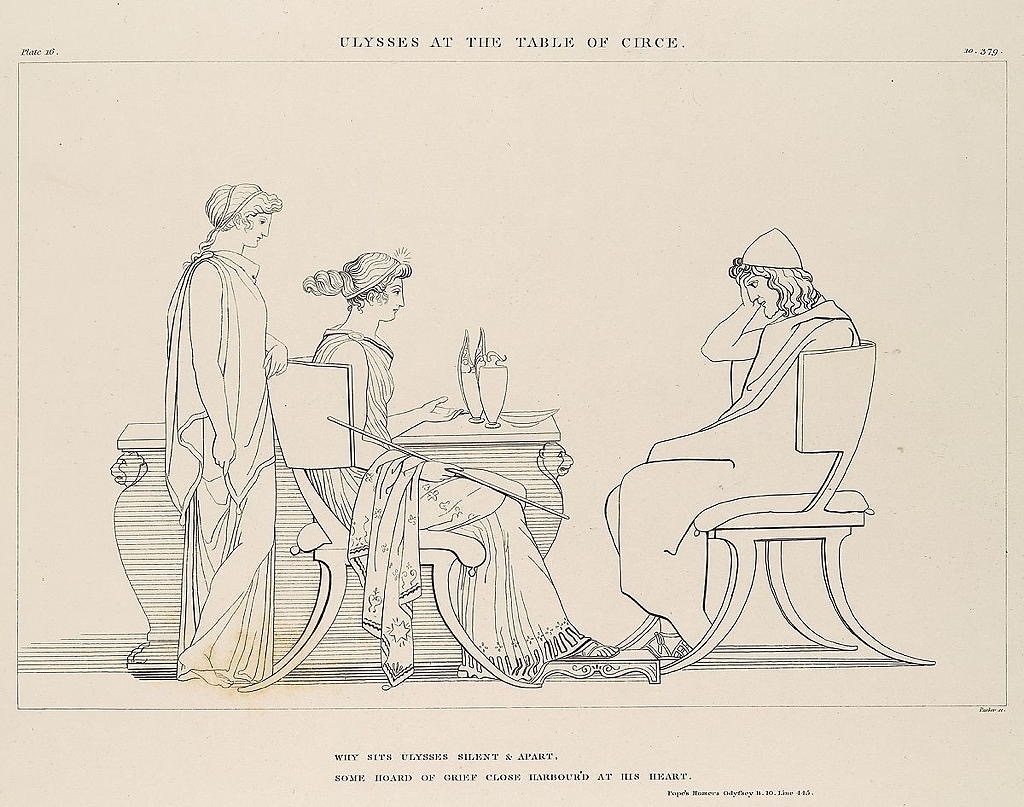TheNarrative

After John Flaxman: Ulysses at the Table of Circe
[The Odyssey of Homer] (1805)
"Discovering it's a dance."
For most of history, people believed that an actual Homer, author of The Odyssey, existed. In the nineteen twenties, a young anthropologist made a shocking declaration. He claimed to have determined that Homer was most probably a role and not an actual individual historical figure. He based his assertion on observation. He visited Macedonia and listened to traditional tavern singers, who specialized in singing lengthy epic poems, often hours long. He learned that these singers could repeat these poems verbatim, night after night, with virtually no variation, a seemingly inhuman capability, yet each such singer managed it, even when in his cups. This narrative first received much push-back from the field, but over time, the simple logic of the story seemed to supplant the centuries of alternative explanation. It was eventually much easier to believe that generations of storytellers developed and preserved these stories over eons rather than that a single individual lived and chronicled them in a single generation. The story about the story changed. ©2022 by David A. Schmaltz - all rights reserved
A fair part of Authoring has nothing to do with the physical manuscript, the apparent story in question, but the story about that story. Why was it written? How? By whom? What might be the 'deeper' meaning? Many questions beg answering, none of them strictly necessary but each useful, potentially helpful. Let's say that TheNarrative serves as the master context marker. It attempts to explain the world within which the manuscript emerged, best of times, worst of times stuff. Most manuscripts could definitely stand without TheNarrative, but most manuscripts stand a little taller, perhaps prouder with one. TheNarrative serves as the genealogical contextualization, a link to an historical connection, a hint at how it came to be, for no story ever simply appears or thrives over time outside of some definite context. A grand presumption supports it, though the manuscript's body of text might make no explicit mention of it.
TheNarrative was missing for my Cluelessness manuscript and this absence complicated my answering the usual Fundamentally Unanswerable Questions its proposal demanded. In other worlds, an Author might hire a publicist or a Public Relations professional to help define TheNarrative behind their story, but that's an alternate universe from where I live. As I've disclosed here over the past week or more, I've been searching without really understanding what I've been searching for, a meta-story, I suspected, or just a cogent explanation of how this one might be different, unique, important. As Author, I might have been the very worse person to assign to this task, and I understood that. I hired an old friend to serve as my conscience and my counsellor, to keep me honest, and another volunteered to produce a shoddy first draft of responses to The Fundamentally Unanswerable Questions. The shoddiness was key to me finding transforming energy in what he produced, a fresh gist, another wrinkle.
It took its time arriving. I've so far survived the interminable wait before the story started telling itself. First, in my head, later, out of my my mouth, later, perhaps, out through the tips of my typing fingers. TheNarrative, like Homer's Odyssey, seems natively an oral history, a spoken story, repeated with slight variations which eventually produce fairly precise vibrations, a coherent tale seemingly as natural as breathing. It might well seem extraordinary with every telling, but it never seems forced, its meanings settled. I become the troubadour performing, not forgetting important pieces but remembering all the joins and surfaces in proper order. I'm not quite there yet. TheNarrative's still emerging, but I'm noticing an increasing lightening of the burden I felt myself struggling to carry through recent weeks. The sun actually came up yesterday morning and I spent the day discovering and fitting fresh pieces together. I can feel where this Authoring effort's going now. I've not arrived and I expect some additional complications between now and the end of this quarter, but the story about the story's coming now and I suspect that no power could stop it from completing its emergence.
And I suspect that it was in the centuries after the first Homeric troubadour shared the story that the thread settled down enough to tolerate coherent transcription, and that this work was not accomplished by a single person in a single generation. TheNarrative must most probably be emergent, not deliberate but the product of much tedious deliberation, considerable trying on and taking off. The author's ear will hear when it nears completion and also hear when it's far from done yet. His nose might also disclose relative proximity to doneness. The manuscript itself might have been the product of the Author's head, but TheNarrative, the product of his body. Like with The Odyssey, it's melody, rhythm, and rhyme, a multi-modal performance. Discovering it's a dance. I feel delighted that I had no clue that I would need to produce TheNarrative when I began my Authoring, for I suspect that I would have tried to finish it first or otherwise plan a step for its inclusion. I believe today that TheNarrative must emerge from its absence, a vacancy not initially obvious and later unignorable. It should probably, rightly be a barrier to finishing and so appear at an inconveniencing time. It must be mine.


